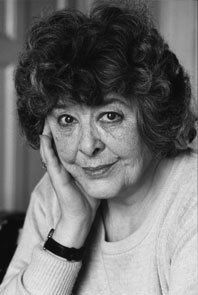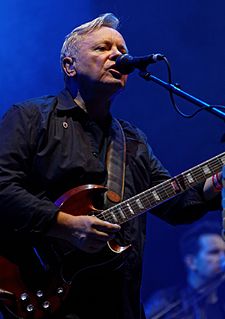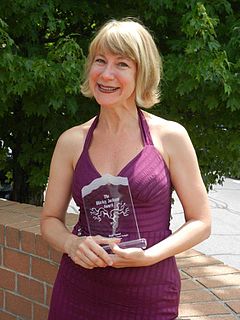A Quote by Amy Tan
My mother always thought if her mother hadn't left her, she would have been happy. All the problems she had never would have happened.
Related Quotes
As a child, Kate hat once asked her mother how she would know she was in love. Her mother had said she would know she was in love when she would be willing to give up chocolate forever to be with that person for even an hour. Kate, a dedicated and hopeless chocoholic, had decided right then that she would never fall in love. She had been sure that no male was worth such privation.
She wondered whether there would ever come an hour in her life when she didn't think of him -- didn't speak to him in her head, didn't relive every moment they'd been together, didn't long for his voice and his hands and his love. She had never dreamed of what it would feel like to love someone so much; of all the things that had astonished her in her adventures, that was what astonished her the most. She thought the tenderness it left in her heart was like a bruise that would never go away, but she would cherish it forever.
I mean, her father was an alcoholic, and her mother was the suffering wife of a man who she could never predict what he would do, where he would be, who he would be. And it's sort of interesting because Eleanor Roosevelt never writes about her mother's agony. She only writes about her father's agony. But her whole life is dedicated to making it better for people in the kind of need and pain and anguish that her mother was in.
Hats change everything. September knew this with all her being, deep in the place where she knew her own name, and that her mother would still love her even though she hadn’t waved goodbye. For one day her father had put on a hat with golden things on it and suddenly he hadn’t been her father anymore, he had been a soldier, and he had left. Hats have power. Hats can change you into someone else.
One thing I did have under my belt was, my mother lost her mother when she was 11. She mourned her mother her whole life and made my grandmother seem present even though I never met her. I couldn't imagine how my mom could go on but she did, she took care of us, she worked two jobs and had four children. She was such a good example of how to conduct oneself in a time of grief. When I lost my husband, I tried to model myself as much as I could on her.
Her life was a slow realization that the world was not for her and that for whatever reason she would never be happy and honest at the same time. She felt as if she were brimming always producing and hoarding more love inside her. But there was no release. table ivory elephant charm rainbow onion hairdo violence melodrama honey...None of it moved her. She addressed the world honestly searching for something deserving of the volumes of love she knew she had within her but to each she would have to say I don't love you.
If she'd spaced her children out and had eleven babies in eleven years, she would have been no better than her own mother and sisters: irresponsible, a welfare cheat, another bit of Sawdust Lane white trash. But as luck would have it, she'd had them all at once, and now she was, overnight, middle-class. And respectable.
We worked all the time, just worked and then we would be hungry and my mother was clearing up a new ground trying to help feed us for $1.25 a day. She was using an axe, just like a man, and something flew up and hit her in her eye. It eventually caused her to lose both of her eyes and I began to get sicker and sicker of the system there. I used to see my mother wear clothes that would have so many patches on them, they had been done over and over and over again. She would do that but she would try to keep us decent.





































